Year of Mistaken Discoveries by Eileen Cook
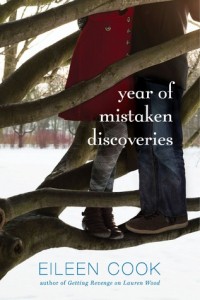 Summary: They say bad things come in threes and Avery is about to find out just how true that statement is. Having her boyfriend break up with her, being turned down for early acceptance at Duke University and the sudden death of her former best friend, Nora, leaves Avery feeling bereft and adrift. Struggling to figure out how to salvage a future Duke acceptance and mourning her friend, Avery uses the fact that she and Nora were both adopted as the basis of her senior class project, searching for her own birth mother and hoping to impress the university with the results. Along the way she befriends Brody, and as their friendship develops into love he provides Avery with some insight into herself and her choices.
Summary: They say bad things come in threes and Avery is about to find out just how true that statement is. Having her boyfriend break up with her, being turned down for early acceptance at Duke University and the sudden death of her former best friend, Nora, leaves Avery feeling bereft and adrift. Struggling to figure out how to salvage a future Duke acceptance and mourning her friend, Avery uses the fact that she and Nora were both adopted as the basis of her senior class project, searching for her own birth mother and hoping to impress the university with the results. Along the way she befriends Brody, and as their friendship develops into love he provides Avery with some insight into herself and her choices.
Number of Pages: 189
Age Range: 14-16
Review: In a story about a young woman so consumed by getting into the same university her parents did she is willing to use her search for her birth mother as a selling point for the admissions office, Avery becomes a person who doesn’t know who she is anymore.
Avery’s a complicated character as her insecurity over being adopted feeds her fear of losing her adoptive parents love. They’re her family, but somewhere inside of her she questions whether they will still care about her if she doesn’t live up to certain family standards. Except this belief is all in her head. Her adoptive parents are eager to support and love her no matter what, and meeting her birth mother reveals not everyone feels that way.
Brody is my favourite character in the Year of Mistaken Discoveries by Eileen Cook. His ability to capture multi-layered moments others miss in his photographs lends also to his talent in seeing the potential of others. He comes into Avery’s life when she needs him the most, providing an anchor and a distraction as she sorts out her identity and mourns her friend.
What frustrated me about Cook’s book is that I wanted to know more about Nora. Her story of trying to find her birth mother is told in a less than a chapter, a single heartbeat in the pulse of the story. But her tale sounds like it deserves its own book. A fake birth mother who exploits her for money? Rumours of a shady adoption industry in Costa Rica? A character so distraught by her findings that she commits suicide? That’s a story. I wish I could have read it, because I had so many questions.
I also wish Cook had included more from Nora’s guide for Avery. If Nora’s story inspires Avery to find her own birth mother through a sense of guilt and her guide, then I wanted to know what was so inspiring about it. And again, it would have revealed more about Nora’s story. Nora is painted like she is unstable, but at the same time it sounded like she had valid reasons for her eccentric behaviour.
Despite containing serious themes of suicide, questions of origins, and parental issues, it’s a remarkably light read.
Memorable Quotes:
“I’d almost forgotten our shorthand. SOC stood for Sister of Choice. In second grade Nora got the idea that since we were both adopted, maybe we were sisters. We practically had proof: We loved vanilla more than chocolate, couldn’t stand the smell of cauliflower cooking and could touch our tongues to the tips of our noses. We’d gotten really excited about the idea, until my mom sat us down and explained that it was unlikely we were twins separated at birth, not the least because Nora was part Costa Rican and I was clearly as white as they come, and having a secret twin was apparently the kind of thing the adoption agency would have mentioned in the official paperwork. When we got back to my room, I’d burst into tears. I had been so sure we were sisters. Nora patted my back and told me not to be sad, we were better than sisters, and after all, being born sisters was just an accident of birth. We were sisters of choice. SOC. Whenever we would leave each other we would call out ‘SOC,’ and we signed it at the bottom of all our notes to each other.” – Avery from Year of Mistaken Discoveries by Eileen Cook, page 27
“We walked outside and I stopped short. The sun had come out while we had been inside. The light bounced off the wet leaves lying in the street, and the puddles in the parking lot gave off a glare. Despite the sunshine it was cold. The sky was a brilliant blue, and the air felt razor sharp when I breathed it in. It was painfully beautiful.” – Avery from Year of Mistaken Discoveries by Eileen Cook, page 46
“‘That’s the hard thing with some people. They see us not just for who we are, but for who we could be. They hold us to a higher standard. They make us better because they believe we can be better, and that makes us believe it too.’
In that moment I began to believe.” – Conversation between Avery’s mother and Avery about Brody pushing her to be a better person from Year of Mistaken Discoveries by Eileen Cook, page 168
Year of Mistaken Discoveries by Eileen Cook is published by Simon Pulse, (2014).
What Happened to Serenity? by PJ Sarah Collins
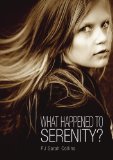 Summary: After the Ecological Revolution, Katherine in her family live in a community where only Father, their leader, is allowed to ask questions. But when Katherine finds out her best friend’s sister has disappeared, the questions she already had increase exponentially in number. Chastised by her community for her curiosity, Katherine is threatened with being assigned manual labour when she is finished school and then is publicly humiliated when her long hair is cut short in front of her classmates. Daunted but compelled to find out the truth, Katherine continues to investigate, each discovery leading her further down a rabbit hole she never could have imagined.
Summary: After the Ecological Revolution, Katherine in her family live in a community where only Father, their leader, is allowed to ask questions. But when Katherine finds out her best friend’s sister has disappeared, the questions she already had increase exponentially in number. Chastised by her community for her curiosity, Katherine is threatened with being assigned manual labour when she is finished school and then is publicly humiliated when her long hair is cut short in front of her classmates. Daunted but compelled to find out the truth, Katherine continues to investigate, each discovery leading her further down a rabbit hole she never could have imagined.
Number of Pages: 217
Age Range: 15-18
Review: What intrigues me about What Happened to Serenity? by PJ Sarah Collins is the double-entendre of the title. Katherine is trying to find Serenity, her best friend’s little sister, but she’s also trying to find serenity in a Community that constantly tries to control who she is. Except upon finishing the book I realised Katherine doesn’t actually find her. Yes, she does know where Serenity, the person, is by the end, but Serenity never actually appears in the story. She’s a major catalyst in Katherine’s life, but remains behind-the-scenes.
And without giving too much away, the idea of serenity is a bit elusive too. When Katherine realises everything she has been looking for exists in her family, it is a beautiful moment.
It’s an intellectual read as Collins explores humanity’s quest for perfection, the necessity of questioning especially when people tell you not to and the concept of free will. Katherine is a truly admirable character. Despite all the resistance she meets, the punishments the Community threats her with, the perceived distance between her and her parents, and the abandonment by the boy she had a crush on, Katherine doggedly persists in the pursuit of truth and the answers to the many, many questions she has.
The answers are astounding. For a girl raised in such a sheltered Community, Katherine is vastly out of her depth but repeatedly shows courage as she pushes through anyway. Protecting her brother and her parents motivates her to continue to take risks and love for her best friend drives her to find Serenity at all costs.
There’s a lot I can’t say, because I don’t want to wreck the suspense and surprise of the story, but suffice it to say it’s a book I will be considering for days.
Memorable Quotes:
“Much of the greatness of the human spirit
can be seen in our passionate pursuit
of knowledge, truth, justice, beauty, perfection, and love.
At the same time, few things are so haunting
as the stories of the very greatest seekers falling short.” – Os Guiness, from The Call in What Happened to Serenity? by PJ Sarah Collins, on the dedication page
“When the first flakes fall
We stop what we are doing
As if already frozen.
And even though we know
That bitter cold is coming
For some reason
We smile
And run outside
Dancing.” – Katherine from What Happened to Serenity? by PJ Sarah Collins, page 11
“I think of Mom. My heart feels heavy and I can hardly explain why. It has something to do with her rye bread and low table and all the things she does for me and Scott, the way she held back her sobs and we were out of the Town Circle, something to do with how difficult I can be. All along, I’ve thought I was the intelligent one, the one who sees the problems. I assumed that I’m the only one willing to risk for the truth. I’ve judged Mom because I thought she was a simpleton to believe in a perfect Community. Now I believe that Mom knows things she doesn’t talk about and I feel differently about her, loyal, protective, admiring.
Her grief has touched me. Maybe I don’t understand her, but there is something very brave about her wanting to love, wanting to grow life in an imperfect place.” – Katherine from What Happened to Serenity? by PJ Sarah Collins, pages 93-94
“I know now Anna would do anything for me. And it’s nice for a minute just to enjoy this. I have a best friend who knows and trusts me. I can never be alone again, even if we are separated.” – Katherine from What Happened to Serenity? by PJ Sarah Collins, pages 127-128
“I wonder if family relationships have always been like this, even before the Ecological Revolution, with so much left unspoken between a parent and a child. I wonder if my parents just now fought the urge to ask, ‘Where were you after school? Why are you covered in dirt? How did you scratch your shin? Why do you seem upset this week? Have you been crying? What’s on your mind? Somehow, I think they do.” – Katherine from What Happened to Serenity? by PJ Sarah Collins, pages 137-138
“What happens to the unuttered?
Or inappropriate words that are swallowed?
Feelings too raw to write down?
Or questions never asked?
Do they disappear?
Return?
Or explode?” – Katherine from What Happened to Serenity? by PJ Sarah Collins, page 161
What Happened to Serenity? by PJ Sarah Collins is published by Red Deer Press, (2011).
Siena Summer by Ann Chandler
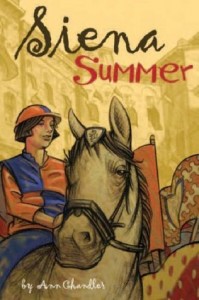 Summary: Spending her summer in Italy with relatives, Angela is taking a break from her mourning mother after the death of her father and exposing herself to a new way of life. When she has the opportunity to help out a family by exercising their horses, she jumps at the chance. Introduced to a horse she calls Storm who is marked to be destroyed after throwing another rider and stepping on her, Angela quickly realises this horse is scared instead of angry and endeavours to save his life. With a summer romance in the works, a new friend and a community caught up in an upcoming horse race, Angela soaks in her experiences and takes some chances, all while supporting the horse she has come to love.
Summary: Spending her summer in Italy with relatives, Angela is taking a break from her mourning mother after the death of her father and exposing herself to a new way of life. When she has the opportunity to help out a family by exercising their horses, she jumps at the chance. Introduced to a horse she calls Storm who is marked to be destroyed after throwing another rider and stepping on her, Angela quickly realises this horse is scared instead of angry and endeavours to save his life. With a summer romance in the works, a new friend and a community caught up in an upcoming horse race, Angela soaks in her experiences and takes some chances, all while supporting the horse she has come to love.
Number of Pages: 142
Age Range: 13-14
Review: In a delightful tale about Angela’s summer vacation in Italy, Siena Summer by Ann Chandler is a cultural experience. The death of Angela’s father causes a rift between Angela and her mother, and getting away seems like a good temporary solution.
What it turns out to be is a chance for Angela to spread her wings and be independent. She finds understanding and comfort living with her aunt and uncle, and uses her love of horses to help save Storm from certain death. Angela shows courage as she risks injury to prove what’s really wrong with Storm, and encourages Catarina to get back on a horse after Storm has injured her.
But the best part is the horse race. It’s an event in the community everyone is excited about, and while I didn’t quite get all of the specifics, I loved the twist Chandler includes.
It’s a bit hard to call the age range on this one. The story itself seems more geared toward pre-teen, but with the element of Angela and Tony’s quickly progressing relationship I bumped it up into the early teen range.
Memorable Quotes:
“Angela remembered when her dad had suddenly died of a heart attack. It was awful. One day he was there, and the next he was just gone, but his coat was still hanging behind the door. It was odd when everyone told her they were sorry. ‘What did they have to be sorry about?’ She knew they meant well, but it sounded so stupid.” – Angela from Siena Summer by Ann Chandler, page 29
“‘You’re scared!’
‘No!’
‘Yes, you are, Cat. But it’s okay. I understand. You think I’m not scared lots of times? Think I’m not scared to death before every competition? You think I wasn’t scared out there today?’
Catarina sniffled again, wiped her nose on her sleeve and looked up. ‘You were?’ She said. Her eyes were flooded with tears. ‘It didn’t seem like it. I thought you were so brave.’
‘I was terrified! I felt like throwing up!’ Angela leaned closer to Catarina. ‘You’ve gotta do it, Cat! You’ve gotta get on again!’
‘I can’t,’ Catarina whispered.
Angela knelt beside the chair and looked up at her friend. ‘I’ll help you, Cat. It’ll be okay, I promise. Besides, Storm likes you.’
Catarina shook her head.” – Conversation between Angela and Catarina about riding again from Siena Summer by Ann Chandler, page 59
Siena Summer by Ann Chandler is published by Tradewind Books, (2009).
Swim the Fly by Don Calame
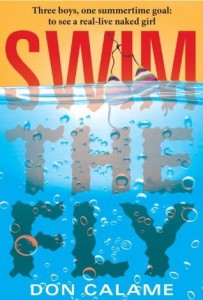 Summary: Matt, Sean and Cooper are best friends who have a goal for their summer vacation: seeing a woman naked in real life. But when Matt volunteers to rescue his swim team by swimming the butterfly stroke race in competitions in order to impress a girl, his focus shifts. With a body built for freestyle swimming, it’s going to take everything he has to even complete the race let alone place in it. Fortunately Sean and Cooper’s ingenuity when it comes to achieving their summer goal also comes in handy with helping Matt get through the competitions one by one. It’s certain to be a summer they will never forget.
Summary: Matt, Sean and Cooper are best friends who have a goal for their summer vacation: seeing a woman naked in real life. But when Matt volunteers to rescue his swim team by swimming the butterfly stroke race in competitions in order to impress a girl, his focus shifts. With a body built for freestyle swimming, it’s going to take everything he has to even complete the race let alone place in it. Fortunately Sean and Cooper’s ingenuity when it comes to achieving their summer goal also comes in handy with helping Matt get through the competitions one by one. It’s certain to be a summer they will never forget.
Number of Pages: 345
Age Range: 15-17
Review: Motivated by their overwhelming hormones, three best friends decide the next step on the path to having sex someday is seeing a real live woman naked. It’s not easy, and leads to many embarrassing moments and misunderstandings. Nothing seems to go as planned as they try many creative options to achieve their goal.
But this story is told from Matt’s perspective, and him aspiring to get the girl by volunteering for an impossible task of swimming the fly also seems hopeless. Backed by his two best friends he makes his way through the competitions one at a time. If he can only win the last race, he is certain he can catch the eye of his crush Kelly, except getting to that point is harder than it seems.
There are many, many hilarious moments in Don Calame’s book, but my favourites involved Matt’s grandfather. Trying to woo Matt’s newly widowed neighbour, Mrs. Hoogenboom, Matt’s grandfather seems to get him into one scrape after another. His logic when it comes to enticing her out of her grief is humourous, and when I read the scene where Matt is forced to play Mrs. Hoogenboom so his grandfather can practice asking her out I laughed till I cried.
Matt’s just such a great character. Yes, I was often grossed out by the antics of teenage boys, but Matt quickly separated himself from the pack, showing himself to have heart and increasing respect for women. Calame has truly captured the voice and dreams of a group of teen boys, while managing to make them loveable at the same time. They are lucky to be surrounded by a cast of equally memorable characters: sisters, parents, a grandfather and a mysterious Ulf.
Swim the Fly is my favourite of Calame’s trilogy about the three best friends, and I have read them all. They’re unique because Calame isn’t afraid to show the guys as they are, even with their flaws, swearing, and various bodily excretions. And he does it all while keeping his reader in stitches.
Memorable Quotes:
“It’s up with the arms and head, suck in a breath, and back under again. A hard kick with feet together. Weaving in and out of the water. You’re supposed to look like dolphin. Smooth and graceful. You’re not supposed to look like a palsied whippet struggling for its life. Which is exactly what I feel like. I am all splash and very little momentum.” – Matt talking about the butterfly stroke from Swim the Fly by Don Calame, pages 41-42
“Ms. Luntz is trying to help Sean up, but he’s not making it easy. He’s all deadweight, wriggling around.
‘Don’t move me,’ Sean groans.
And that’s when he makes a dive for the edge of the pool and lets fly a rainbow torrent the like of which I’ve never seen before in my life. It’s like an open fire hydrant plugged directly into hell.” – Matt describing Sean throwing up from Swim the Fly by Don Calame, page 110
“I realize now that I am a terrible, terrible liar. I mean, how am I supposed to get a picture of my entire swim team in dress clothes with towels around their necks and goggles on their heads? And how am I supposed to get Pete to buy Mom a giant, unhidable present? What would that even be? A statue? A totem pole?” – Matt reflecting on his lies to explain his attire and desperation to keep his mother out of his brother’s room from Swim the Fly by Don Calame, page 141
“But Peter just slogs over to his bed and sits down, the mattress squeaking under his weight.
And then he starts to sob. His whole body shaking. He buries his face in his hands.
I knew he’d be upset, but I didn’t think he’d be so broken up he wouldn’t even be able to beat the crap out of me. I don’t think I’ve ever seen him cry like this.
Part of me feels like I should go over and give him a hug. But my survival instinct reminds me that you don’t hug a bear with a sore head, even if he’s sad.” – Matt from Swim the Fly by Don Calame, page 307
Swim the Fly by Don Calame is published by Candlewick Press, (2009).
Victoria by Silvana Goldemberg, translated by Emilie Smith
 Summary: With younger twin brothers, Victoria knows living with her aunt and her aunt’s abusive boyfriend after her parents are out of the picture is not ideal, but isn’t sure how support them on her own. When her aunt’s boyfriend makes a pass at her though, Victoria has to choose between taking a risk by leaving home or being raped. Life on the streets of Parana, Argentina isn’t easy, and Victoria encounters several seedy characters dealing with drugs. Still she manages to find a place to live, support, and love, but all is put in danger when those calling the shots and her friend have a disagreement about money.
Summary: With younger twin brothers, Victoria knows living with her aunt and her aunt’s abusive boyfriend after her parents are out of the picture is not ideal, but isn’t sure how support them on her own. When her aunt’s boyfriend makes a pass at her though, Victoria has to choose between taking a risk by leaving home or being raped. Life on the streets of Parana, Argentina isn’t easy, and Victoria encounters several seedy characters dealing with drugs. Still she manages to find a place to live, support, and love, but all is put in danger when those calling the shots and her friend have a disagreement about money.
Number of Pages: 134
Age Range: 13-15
Review: Faced with a dangerous situation at home, Victoria decides life on the street is preferable. If she can only find a job and a place to live, then perhaps she can rescue her little brothers as well and begin a new life together.
Except Victoria is just fourteen years old, and while her trust in others extends to people she meets while she is on the streets, Silvana Goldemberg could have easily written a much darker tale where that trust was more misused. Thankfully, most of the people she does encounter are willing to help and protect her. At first, she finds a place to live in exchange for work in a store, but as the novel continues Victoria is able to find a more permanent place to live and follow her dream of going back to school and being reunited with her brothers.
I like Victoria as a character because although her age makes her a bit naive, she has guts. Victoria is determined to make a better life for her family after the loss of her parents and shows bravery and courage in her pursuit of what she wants. She learns it’s okay to ask for help from others, but that others might not always be trustworthy. Entangled in rules and hierarchy of street life she doesn’t always understand, Victoria still manages to make her way and secure a better future for herself.
Reading about South America is something I rarely have a chance to do, and in that respect Goldemberg’s book is eye-opening. I especially enjoyed all of the quotes Goldemberg put in from Argentinian songs.
Memorable Quotes:
“For children who suffer from violence and poverty.
For the justice and dignity they deserve.
Any similarity between fiction and reality has more to do with coexistence than coincidence.” – Silvana Goldemberg’s Dedication from Victoria by Silvana Goldemberg
Victoria by Silvana Goldemburg, translated by Emilie Smith is published by Tradewind Books, (2000).
Men of Stone by Gayle Friesen
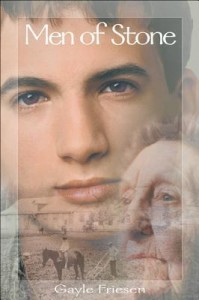 Summary: Aunt Frieda’s announcement that she’s coming to stay with Ben, his three sisters and his mother takes them all by surprise. It’s been years since Aunt Frieda’s nephew (Ben’s father) died, and no one knows exactly why she would want to visit now. But once they become accustomed to her, Aunt Frieda’s presence and easy nature begins to have subtle and positive effects on all of them. At a time when Ben is questioning what he knows because of his ongoing grief over the death of his father and the threat of physical violence at school, Aunt Frieda connects by telling him her own stories of hardship and pain. In the end, it’s up to Ben whether to fight back, or to choose another way.
Summary: Aunt Frieda’s announcement that she’s coming to stay with Ben, his three sisters and his mother takes them all by surprise. It’s been years since Aunt Frieda’s nephew (Ben’s father) died, and no one knows exactly why she would want to visit now. But once they become accustomed to her, Aunt Frieda’s presence and easy nature begins to have subtle and positive effects on all of them. At a time when Ben is questioning what he knows because of his ongoing grief over the death of his father and the threat of physical violence at school, Aunt Frieda connects by telling him her own stories of hardship and pain. In the end, it’s up to Ben whether to fight back, or to choose another way.
Number of Pages: 216
Age Range: 14-16
Review: Since his father died, Ben has been the only male in female-dominated household. Outnumbered four to one, Ben isn’t exactly enthusiastic about increasing the disparity with his Aunt Frieda’s visit. Though she is an older relative he doesn’t know much about, Aunt Frieda becomes a friend who challenges him to consider his actions and not fall into the trap of hatred when things start going badly at school and one of his best friends runs away.
Ben is a complex character. While it’s clear he loves his mother and sisters, it’s also clear that having to live without his father has affected his life. While his passion for dance has been embraced by his family, school is another matter, and I can’t help but wonder if his father had been around whether he would have learned how to fit in better. At least then he might have also had someone better equipped to help him deal with potential self-esteem issues.
But the great thing about Ben is that while he struggles, he shows a strength of character his own mother doesn’t believe he has. Thankfully Aunt Frieda does come to visit, because she and Ben seem to be two peas in a pod who intuitively understand each other. It’s a beautiful relationship across the generations, and Aunt Frieda seems to come at a moment when everyone needs her most.
I love how Ben ends up rejecting a life ruled by pain and anger as a man of stone like the men in Aunt Frieda’s stories. I also enjoyed Ben’s introspective nature and how he can see others giving into something he refuses to choose. It’s powerful and thought-provoking, and I had several memorable quotes due to the nature of the book.
My favourite part of Friesen’s story is how she uses dance as a metaphor for being yourself. As a child, Ben dances with abandon. He’s naturally talented, he’s passionate, and he doesn’t care what others think. Once the teen years strike though and the other kids start making fun of him, he hides his love of dance away and still has to put up with being called Ballerina Boy. But while he pushes his true nature down, there are glorious moments when it breaks free. When he’s on his own and then with Aunt Frieda, dancing is an integral part of who he is. And eventually, he learns to embrace his true self.
Men of Stone has a wonderful voice and explores a family’s journey though grief with the help of a relative who knows what pain truly is. I loved it.
Memorable Quotes:
“Horrible Questions. But more horrible still was the silence afterward. As unprepared as we were for our dad to die, we were just as unprepared to discover that our mother didn’t control the universe.” – Ben from Men of Stone by Gayle Friesen, page 41
“I spent the rest of the evening in my room actually doing homework, but I kept thinking about Stan. Then I got to thinking about how Aunt Frieda’s husband had been taken away, and I wondered, what made somebody turn to stone? I flicked through my history book and looked at the pictures of all the statues of men on horseback, men holding rifles, men sitting on rock-slab chairs looking down from great heights. Great men … war heroes. What made a man a hero? Did all heroes end up carved out of great blocks of stone?” – Ben from Men of Stone by Gayle Friesen, page 97
“I could relate. All alone in a house full of people. Joni probably felt that way too. Even Mom. Ever since Dad died, it was as if a big hold had been blown into the side of our house, and nobody could figure out how to fill it. I wondered if Aunt Frieda had felt that way when they’d taken Henry away.” – Ben from Men of Stone by Gayle Friesen, page 105
“The ambulance guys poked and prodded, lifting limbs and pressing to see where I was damaged. I tried to float away. What a disappointment my body was – so bloody fragile. I couldn’t help thinking how invincible I felt when I was dancing. How every part of me responded to my orders – even as I ached with exhaustion. Now everything was spinning out of control, beyond my reach. I closed my eyes, willed the blackness to come.” – Ben from Men of Stone by Gayle Friesen, page 142
“‘What I’m saying is that you must choose what defines who you are. The truth of who one is is complex – it is not merely good of simply bad. I believe that truth is the image of God in which we were created, but it has taken me a lifetime of experiences and choices to discover this. You have to find your own way. Don’t let yourself be limited by the hatred you feel. Don’t let it stop your search.'” – Aunt Frieda talking to Ben from Men of Stone by Gayle Friesen, page 175
“‘A heart full of hatred is numb. But a broken heart is felt right to the quick. And a broken heat can be mended.'” – Aunt Frieda talking to Ben from Men of Stone by Gayle Forman, page 183
“‘Think about it. In every society at every point in history there have been wars. It’s always been that way, probably always will be. People fight – over land, over religion … over a girl. And it’s not who’s right – if anyone. It’s usually about strength. Strong guy, army, country rolls over the weak.’
‘I guess.’
‘That’s why it never ends. There’s always somebody a little stronger. Refusing to fight means that you’re saying the fighting ends here. Strength is not truth.'” – Conversation between Matt and Ben about the true motivation behind war from Men of Stone by Gayle Friesen, page 197
Men of Stone by Gayle Friesen is published by Kids Can Press, (2000).




 Amy Mathers has been passionate about reading from a very young age, and hopes others will share her enthusiasm for funding a teen book award.
Amy Mathers has been passionate about reading from a very young age, and hopes others will share her enthusiasm for funding a teen book award. 





